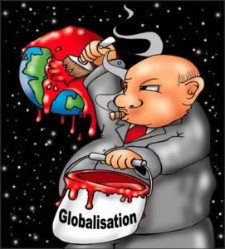Globalization
There has never been another time in history in which the United States’ influence on the rest of the world has been as great as it is today — or its understanding of it less sufficient.
Global integration is the major story of our time, but vast numbers of Americans — particularly young Americans — know very little about the outside world.
Global integration is the major story of our time, but vast numbers of Americans — particularly young Americans — know very little about the outside world.
*Active Links ...
*Lausanne (Protestors wearing *G8 heads of state masks, said the G8 were ignoring the plight of the world's poor, lead a demonstration rejecting the policies of the G8, and the very nature of a body which claims to be the world's board of directors.
*Edinburgh an estimated 225,000 protesters marched as part of the Make Poverty History campaign as musicians performed in Live 8 concerts around the globe.
*Edinburgh an estimated 225,000 protesters marched as part of the Make Poverty History campaign as musicians performed in Live 8 concerts around the globe.
*San Francisco Anti-Capitalist Convergence and March takes to the Streets and Resists the Capitalist War Machine! Call for the West Coast anti-war and anti-capitalist mass convergence, in San Francisco, in solidarity with the mobilization against the Group of Eight (G8) summit in Scotland.
"One euro a day, that's what one third of humanity, or two billion people, are living on! Three euros a day, that's the contribution of each American citizen towards the US military budget.")
*Hong Kong An estimated 10,000 protesters were present during the G8 meeting. The areas around the convention center, where the meetings took place, were barricaded. During the last days of the summit, the police arrested more than 1000 people, many of whom reported police brutality and ill-treatment of prisoners.
*Genoa - G8 confrontation 100,000 seek justice - US Mainstream media ignore it ...
(Situation is EXTREMELY tense and violent. There are sirens to be heard all the time, and helicopters are flying over the scene continuosly. Our reporters inside the building are shocked by the violence of police. No deal is better than a bad deal and social movements are uniting for protest against the WTO in Hong Kong and many cities around the world.)
(Situation is EXTREMELY tense and violent. There are sirens to be heard all the time, and helicopters are flying over the scene continuosly. Our reporters inside the building are shocked by the violence of police. No deal is better than a bad deal and social movements are uniting for protest against the WTO in Hong Kong and many cities around the world.)
Other G8 protests and confrontations ...
*Canadian G8 Confrontations
*Genoa G8 Reports
*Global Action Database
*Canadian G8 Confrontations
*Genoa G8 Reports
*Global Action Database
Is globalization an internationalization of opportunities or the creation of reservoirs of endemic poverty which perpetuate a have/have-not scenario?
Is globalization is about squeezing the bottom line, shifting jobs from one place to another, creating unemployment in areas where employment formerly existed, and holding other areas down with low wages, so that they cannot develop?
Is globalization is about squeezing the bottom line, shifting jobs from one place to another, creating unemployment in areas where employment formerly existed, and holding other areas down with low wages, so that they cannot develop?
Is globalization a nicely-crafted mechanism, protected by its institutions, keeping the haves rich and the have-nots poor? The richer countries are imposing import duties and providing subsidies for their producers to dump their goods at fictitious prices so that the poorer countries cannot compete.
Is Globalization supposed to be an inter-exchange of cultures in a wondrous diversity of stimuli? Or is what we see a world which is crying out to be multi-polar, with a self-appointed policeman doing everything it can to create a unipolar approach to crisis management, in a world rent by increasing intolerance and conflict?
Is Globalization supposed to be an inter-exchange of cultures in a wondrous diversity of stimuli? Or is what we see a world which is crying out to be multi-polar, with a self-appointed policeman doing everything it can to create a unipolar approach to crisis management, in a world rent by increasing intolerance and conflict?
By 2050, more than 90% of the world's population will be living in less developed countries, in many cases without enough food to sustain themselves, rendering them wholly dependent upon foreign aid programs.
Before in the international economy, individuals and firms from different countries traded goods and services across national boundaries, and trade was closely regulated by nation-states.
Now in the global economy, goods and services are produced and marketed by an oligopolistic web of global corporate networks whose operations, although spanning several national boundaries, are only loosely regulated by nation-states.
The global economy is an information economy, in which the method of production has shifted from mass production of goods at a centralized location to a flexible system of production.
Before in the international economy, individuals and firms from different countries traded goods and services across national boundaries, and trade was closely regulated by nation-states.
Now in the global economy, goods and services are produced and marketed by an oligopolistic web of global corporate networks whose operations, although spanning several national boundaries, are only loosely regulated by nation-states.
The global economy is an information economy, in which the method of production has shifted from mass production of goods at a centralized location to a flexible system of production.
Advanced combinations of telecommunications and computing
technologies have underpinned a new social division of labor.
technologies have underpinned a new social division of labor.
Globalization means ...
1. Flows of business personnel, guest workers, tourists, immigrants and refugees.
2. Flows of machinery, technology and soft ware produced by trans-national corporations and government agencies.
3. Flows of capital, currencies, and securities.
4. Flows of images and information through print media, television and films.
5. Flows of ideological western world views like democracy, sovereignty and welfare rights.
Globalization has changed radically, the concept of planned growth of cities. The power of national governments has been considerably eroded by the global nature of economic activities.
1. Flows of business personnel, guest workers, tourists, immigrants and refugees.
2. Flows of machinery, technology and soft ware produced by trans-national corporations and government agencies.
3. Flows of capital, currencies, and securities.
4. Flows of images and information through print media, television and films.
5. Flows of ideological western world views like democracy, sovereignty and welfare rights.
Globalization has changed radically, the concept of planned growth of cities. The power of national governments has been considerably eroded by the global nature of economic activities.
Governments are obliged to entrust decisive influence over the employment, incomes and welfare of the population, to external forces and global markets — the outcome of which can neither be predicted nor determined.
The rise of the so-called 'knowledge economy' has meant that economists have been challenged to look beyond labour and capital as the central factors of production.
The rise of the so-called 'knowledge economy' has meant that economists have been challenged to look beyond labour and capital as the central factors of production.
Globalization and the impact of
multinationals on local communities
multinationals on local communities
Multinationals establish or contract operations (production, service and sales) in countries and regions where they can exploit cheaper labour and resources. It can also mean large scale unemployment in those communities where those industries were previously located. The wages paid in the new settings can be minimal, and worker's rights and conditions poor.
Multinationals constantly seek out new or under-exploited markets. They look to increase sales often by trying to create new needs among different target groups. Child and youth market has grown into one the most profitable and influential sectors.
There has been a significant acceleration and intensification (and globalization) with the rise of the brand and a heavier focus on seeking to condition children and young people to construct their identities around brands.
There has been a significant acceleration and intensification (and globalization) with the rise of the brand and a heavier focus on seeking to condition children and young people to construct their identities around brands.
We have seen the erosion of public space by corporate activities. Gone are the youth centers, city public parks, outdoor basketball courts or empty lots where kids can play ball. Play areas are now rented out to the highest bidder.
Multinational companies can also have significant influence with regard to policy formation in many national governments and in transnational bodies such as the European Union and the World Bank.
The astronomical growth in the wealth and cultural influence of multi-national corporations over the last fifteen years can be traced back to a single idea developed by management theorists in the mid-1980s: that successful corporations must primarily produce brands, as opposed to products.
Corporations should not expend their finite resources on factories that will demand physical upkeep, on machines that will corrode or on employees who will certainly age and die. Instead, they should concentrate those resources in the virtual brick and mortar used to build their brands.
Multinational companies can also have significant influence with regard to policy formation in many national governments and in transnational bodies such as the European Union and the World Bank.
The astronomical growth in the wealth and cultural influence of multi-national corporations over the last fifteen years can be traced back to a single idea developed by management theorists in the mid-1980s: that successful corporations must primarily produce brands, as opposed to products.
Corporations should not expend their finite resources on factories that will demand physical upkeep, on machines that will corrode or on employees who will certainly age and die. Instead, they should concentrate those resources in the virtual brick and mortar used to build their brands.
The gap between rich and poor
countries has widened considerably.
countries has widened considerably.
Schools and colleges have, for example, become sites for branding and the targets of corporate expansion. Many policymakers automatically look to market solutions. The impact of these forces of globalization also means that they should be a fundamental focus for education and learning.
The massive increase in university enrolment was, however, less a consequence of government policy, than the impact of changing perceptions of the labour market. The surge in student numbers occurred because it became clear to large numbers of people that not having a degree disadvantaged them in the labour market.
The massive increase in university enrolment was, however, less a consequence of government policy, than the impact of changing perceptions of the labour market. The surge in student numbers occurred because it became clear to large numbers of people that not having a degree disadvantaged them in the labour market.
The emphasis is less on community and equity, and rather more on individual advancement and the need to satisfy investors and influential consumers. Education has come to resemble a private, rather than public, good.
The impact of globalization is about the shaping and reshaping of social relations within all countries.
It is time to recognize that the true tutors of our children are not schoolteachers or university professors but filmmakers, advertising executives and pop culture purveyors. Disney does more than Duke, Spielberg outweighs Stanford, MTV trumps MIT.
The impact of globalization is about the shaping and reshaping of social relations within all countries.
It is time to recognize that the true tutors of our children are not schoolteachers or university professors but filmmakers, advertising executives and pop culture purveyors. Disney does more than Duke, Spielberg outweighs Stanford, MTV trumps MIT.
High ideals tend to fade away as State-provided finances decline and as the State encourages closer partnerships between education and industry. Educationally sound and attractively packaged curriculum materials fill the hole in the resources budget of schools and offer technologically sophisticated solutions to the pedagogical problems of overworked teachers.
These pressures have created a conflict of interest between schools' mandate to educate, and their moral and ethical duties to protect children from exploitation by consumer culture. Corporations have recognized and taken advantage of this dilemma.
These pressures have created a conflict of interest between schools' mandate to educate, and their moral and ethical duties to protect children from exploitation by consumer culture. Corporations have recognized and taken advantage of this dilemma.
Modern man is alienated from himself, from his fellow men, and from nature. He has been transformed into a commodity, experiences his life forces as an investment which must bring him the maximum profit obtainable under existing market conditions.
References ...
*Globalism and Poverty
*How to Judge Globalism
*Medicine as a Luxury
*The Mirage of Progress
*Free Markets and Poverty
*Globalism's Discontents
*A Deal Built on Sand
*Justice for Refugees
*Starved for Attention
*The Costs of Orthodoxy
*A Politics of Denial
*Visiting the Frontlines of Globalization
*Globalism and Poverty
*How to Judge Globalism
*Medicine as a Luxury
*The Mirage of Progress
*Free Markets and Poverty
*Globalism's Discontents
*A Deal Built on Sand
*Justice for Refugees
*Starved for Attention
*The Costs of Orthodoxy
*A Politics of Denial
*Visiting the Frontlines of Globalization

































1 comment:
One would hope that Americans would be demonstrating massively if they had a media that was non corporate and not in collusion with government. IMF austerity measures as implimented in Greece are coming here but we have a public totaly ignorant of these measures let alone realize that Obamas new National Commission on Fiscal Responsibility and Reform is trying to impliment these measures......We will awake..someday!...............KAK
Post a Comment